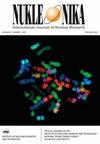黑森州氡土气测量活动:确定地源性氡增强地区的方法
IF 0.3
4区 物理与天体物理
Q4 CHEMISTRY, INORGANIC & NUCLEAR
引用次数: 0
摘要
德国新的辐射保护法于2018年生效,更加强调对自然产生的辐射的保护,特别是氡作为已知的健康危害。法律要求划定氡优先区域,在这些区域应优先采取预防和补救室内高浓度氡的措施。在德国,辐射防护是联邦各州的行政责任。黑森州很早就决定全面调查该州的氡优先区域。为了确定氡优先区,必须确定地质氡势。为了获得氡,土壤气体测量与土壤渗透性相结合是必要的。位于吉森的应用科学大学(THM)负责黑森州的氡土壤气体测量活动。为了在给定的时间框架内实现对黑森州进行统计上合理的调查,并实现不同测量地点的可实现数量,设计了基于地质的概念。考虑到已知的地质构造地质信息,结合行政县,制定了调查策略。先前已知的有关土壤厚度、湿度、易碎性和其他技术限制的信息被用来确定精确的测量位置。在每个地点,测量土壤气体中的氡活度。每一次测量都要确定土壤渗透性。在每个位置进行三次测量。在完成第一组测量后,将介绍活动的设计标准和实践经验。本文章由计算机程序翻译,如有差异,请以英文原文为准。
Radon soil-gas measurement campaign in Hessen: an approach to identifying areas with enhanced geogenic radon
Abstract The new radiation protection law in Germany, which came into effect 2018, puts greater emphasis on the protection against naturally occurring radiation, especially radon as a known health hazard. The law requires the delineation of radon priority areas, where prevention and remediation of high indoor radon concentrations should be taken with priority. In Germany, radiation protection is the administrative responsibility of the federal states. The state of Hesse has early on decided to fully survey the state for radon priority areas. To identify radon priority areas, the geogenic radon potential has to be determined. To achieve that radon, soil-gas measurements combined with soil permeability are a necessity. The University of Applied Sciences (THM) in Giessen is responsible for the radon soil-gas measurement campaign in Hessen. To achieve a statistically sound survey of the state of Hessen with an achievable amount of different measurement locations, and in the given time-frame, a geology-based concept has been designed. Taking into account the known geological information about geological structures in combination with the administrative counties, a survey strategy has been established. Prior known information regarding soil thickness, moisture, digability, and other technical limitations are used to determine the exact measuring locations. At every location, the radon activity in soil gas is measured. The soil permeability is determined for every measurement as well. Three measurements are performed at each location. Having completed the first set of measurements, the design criteria of the campaign and the practical experiences will be presented.
求助全文
通过发布文献求助,成功后即可免费获取论文全文。
去求助
来源期刊

Nukleonika
物理-无机化学与核化学
CiteScore
2.00
自引率
0.00%
发文量
5
审稿时长
4-8 weeks
期刊介绍:
"Nukleonika" is an international peer-reviewed, scientific journal publishing original top quality papers on fundamental, experimental, applied and theoretical aspects of nuclear sciences.
The fields of research include:
radiochemistry, radiation measurements, application of radionuclides in various branches of science and technology, chemistry of f-block elements, radiation chemistry, radiation physics, activation analysis, nuclear medicine, radiobiology, radiation safety, nuclear industrial electronics, environmental protection, radioactive wastes, nuclear technologies in material and process engineering, radioisotope diagnostic methods of engineering objects, nuclear physics, nuclear reactors and nuclear power, reactor physics, nuclear safety, fuel cycle, reactor calculations, nuclear chemical engineering, nuclear fusion, plasma physics etc.
 求助内容:
求助内容: 应助结果提醒方式:
应助结果提醒方式:


